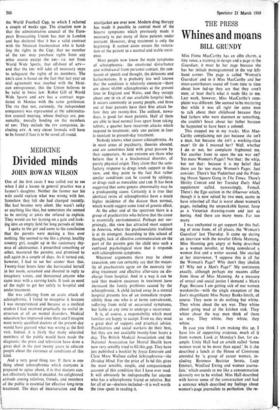Divided minds
MEDICINE JOHN ROWAN WILSON
One of the first cases I was called out to see when I did a locum in general practice was a farmer's daughter. Neither the farmer nor his wife could explain what was wrong with her. Somehow they felt she had changed recently. She bad become very silent. She wasn't sulky or anything like that, but sometimes she seemed to be smiling at jokes she refused to explain. They would see her leaning on a gate and look- ing into an empty field for long periods of time.
I spoke to the girl and came to the conclusion that the parents were making a fuss over nothing. She seemed to me like a plump, healthy country girl, caught up in the customary shy- ness of adolescence. I prescribed something or other, reassured the parents, and promised to call again in a couple of days. As it turned out, however, I had to see her sooner than that. Twenty-four hours later she barricaded herself in her room, screamed and shouted in reply to imaginary voices, and threatened anyone who came near with a carving knife. It took us most of the night to get her safely to hospital and under treatment.
She was suffering from an acute attack of schizophrenia. I failed to recognise it because 1 was inexperienced and because as a medical student I had received practically no useful in- struction at all on mental disorders. Medical education has improved since then and I imagine most newly qualified doctors of the present day would have guessed what was wrong at the first visit. Indeed, it is likely that many educated members of the public would have made the diagnosis; the press and television have done a great deal in the past twenty years to educate people about the existence of conditions of this kind.
And a very good thing too. If there is one thing about schizophrenia which everyone is prepared to agree about, it is that doctors
not effectively handle it unaided. An enlightened attitude among relatives, friends, and members of the public is essential for effective long-term treatment. The days of incarceration and the
straitjacket are over now. Modern drug therapy has made it possible to control most of the bizarre symptoms which previously made it necessary to put many of these patients under restraint. However, drug treatment is only the beginning. It cannot alone ensure the restora- tion of the patient to a normal and stable exist- ence.
Most people now know the main symptoms of schizophrenia : the emotional disturbance and withdrawal from personal contact, the con- fusion of speech and thought, the delusions and hallucinations. It is probably less well known that the condition is relatively common—there are about 60,000 schizophrenics at the present time in England and Wales, and they occupy about one in six of our available hospital beds. It occurs commonly in young people, and three out of four patients have their first attack be- fore they are twenty-five. The outlook, nowa- days, is good for most patients. Half of them are able to lead normal lives apart from taking tablets; a quarter have recurrent attacks which respond to treatment; only one patient in four is resistant to present-day treatment.
Nobody knows what causes schizophrenia. As in most areas of psychiatry, theories abound, and are sometimes held with great passion by their supporters. At one extreme are those who believe that it is a biochemical disorder, of purely physical origin. They claim that the satis- factory response to drugs lends support to this view, and they point to the fact that rather similar conditions can be caused by epilepsy, or drugs such as mescaline and LSD. It has been suggested that some genetic abnormality may be a predisposing cause. Certainly it is true that identical twins of schizophrenics have a much higher incidence of the disease than normal, which would suggest some kind of genetic effect.
At the other end of the spectrum there is a group of psychiatrists who believe that the cause is essentially environmental. Perhaps not sur- prisingly, this view has attracted most support in America, where the psychoanalytic tradition is at its strongest. According to this school of thought, lack of effective communication on the part of the parents gets the child into such a confused psychological state that it responds with schizophrenic symptoms.
Whatever arguments there may be about causation, one can certainly say that the major- ity of psychiatrists agree on the necessity for drug treatment and effective after-care on dis- charge from hospital. And in a way it can be said that modern successes in treatment have increased the family problems caused by the schizophrenic. A child locked away in a mental hospital presents less of an immediate respon- sibility than one who is at home convalescent, suffering from mild or occasional symptoms, but liable at any time to undergo a recurrence. It is, of course, a responsibility which most families are happy to accept. Even so, they need a great deal of support and practical advice.
Psychiatrists and social workers do their best, but they are not available twenty-four hours a day. The British Medical Association and the National Association for Mental Health have now very sensibly tried to fill this gap. They have just published a booklet by Joyce Emerson and Clare Marc Wallace called Schizophrenia—the Divided Mind. For the price of is 6d this gives the most sensible, simple, and compassionate account of this condition that I have ever read. It will obviously be indispensable for anyone who has a schizophrenic friend or relative. But for all of us—doctors included—it is well worth the time spent in reading it.










































 Previous page
Previous page